When to Consider Breeding Your Ferret: Things to Know
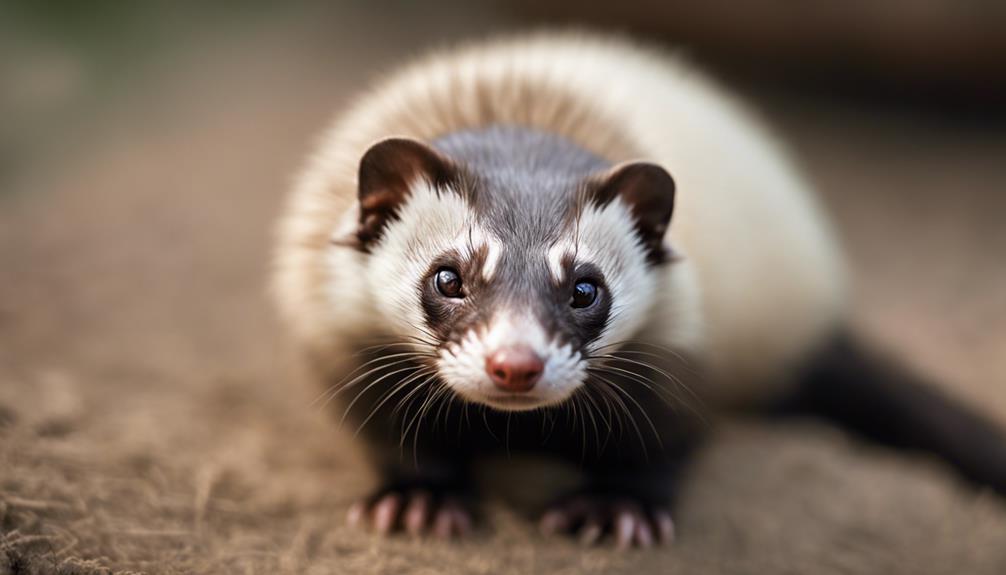
Before breeding your ferret, there are several key considerations to keep in mind. Firstly, you should ensure that both the male and female ferrets are healthy and free from any genetic diseases that could be passed on to their offspring.
It is also important to consider the age of the ferrets, as younger animals may not be physically mature enough to breed safely.
Additionally, you should have a plan in place for caring for the pregnant female and her litter, as well as finding suitable homes for the kittens once they are old enough to be separated from their mother. Breeding should not be taken lightly, as it requires a significant commitment of time, resources, and responsibility.
Taking the time to thoroughly research and understand the breeding process, as well as the potential risks and responsibilities involved, is essential before deciding to breed your ferret. Consulting with a veterinarian or experienced breeder can provide valuable guidance and insight to help ensure a successful and responsible breeding experience. Remember that breeding should always be done with the best interests of the animals in mind, prioritizing their health and well-being above all else.
Ferret’s Health and Temperament
Are you thinking about breeding ferrets? It’s super important to check out their health and temperament first! Let’s dive into why this is crucial for the well-being of the ferrets and their future babies.
Health Check-Up:
- Before breeding, it’s essential to have a vet check your ferret’s health.
- Testing can help spot any genetic diseases or health issues that could be passed on.
- Keeping the ferret population healthy and strong is the goal!
Temperament Assessment:
- Evaluating your ferret’s temperament is key before breeding.
- Ferrets with aggressive or very shy personalities mightn’t be the best for breeding.
- Choosing friendly, social, and well-balanced ferrets can lead to offspring with great traits too.
Breeding Time and Commitment
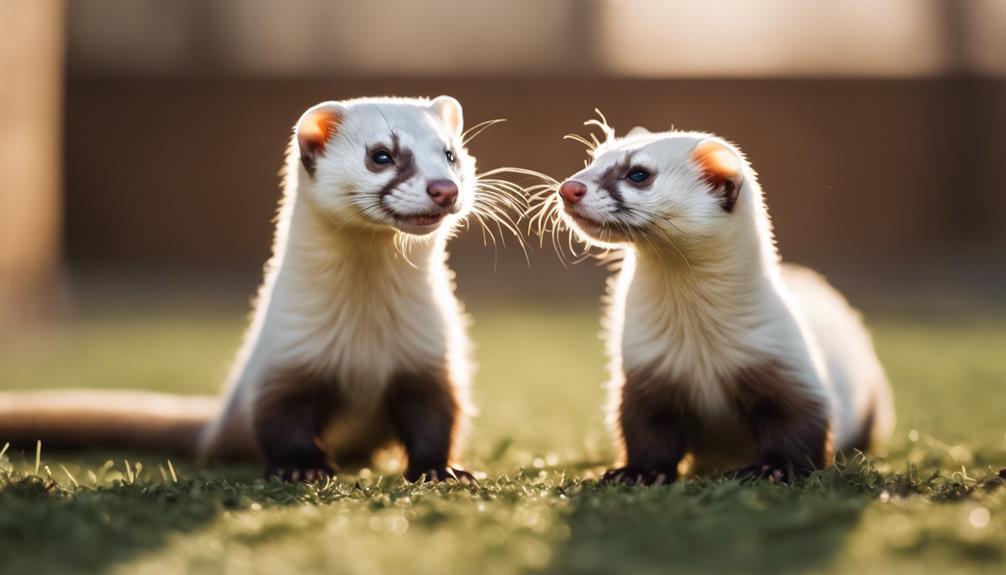
Are you thinking about breeding ferrets? Let’s talk about the time and commitment it takes to do it right:
- Breeding ferrets is a big time commitment, from pairing them up to taking care of the pregnant mom and her babies.
- You’ll need to check on your ferrets every day, especially when they’re mating and giving birth.
- Responsibilities include giving them the right food, keeping their home clean and safe, and watching out for any problems during pregnancy or birth.
- It’s important to spend time socializing the baby ferrets early on to help them grow up well-behaved.
- Finding good homes for the baby ferrets, helping new owners, and being there for any questions after adoption are all part of the commitment.
Breeding Equipment and Setup

When preparing to breed ferrets, it’s crucial to have the right equipment in place. This includes essentials like nesting boxes, bedding materials, and a quiet, comfortable space.
Setting up a designated breeding area ensures the safety and well-being of both the ferrets and their offspring.
Breeding Equipment Essentials
Are you curious about what equipment you need to breed ferrets successfully? Let’s dive into the essentials to create a safe and cozy environment for your furry friends!
Health Monitoring Tools:
- Weight scales to track their health.
- Thermometers to check their temperature.
- Parasite control products to keep them healthy.
Safety Precautions:
- Use escape-proof cages with secure latches.
- Ferrets are escape artists, so make sure they can’t get out easily!
Nesting Areas:
- Provide nesting boxes or areas for the female ferret.
- Create a stress-free space for birthing.
Emergency Preparedness:
- Have the vet’s contact information handy in case of emergencies.
- Always have a backup plan in place.
Ventilation and Temperature Control:
- Proper ventilation is essential for their well-being.
- Ensure the temperature is just right for your breeding ferrets.
Setting Up Breeding Space
Are you ready to create the perfect space for your ferrets to breed happily and healthily? Let’s set up the ideal breeding area with all the essential equipment and careful planning!
Breeding Space Essentials:
- Ventilation: Do you know what keeps the air fresh and clean for your ferrets? It’s proper ventilation! This means having good airflow in the space to prevent any bad odors and keep your ferrets healthy.
- Temperature Control: Did you know that ferrets like it cozy and warm? They thrive in temperatures between 60-80°F. You can make sure they stay comfy by using a thermometer and heater to maintain just the right conditions for them.
- Cleaning Routine: How do you keep your ferrets’ space squeaky clean? By having a regular cleaning routine! Disinfecting surfaces, changing bedding, and washing food and water dishes are all important tasks to prevent any icky diseases and keep things hygienic.
Understanding Breeding Cycles
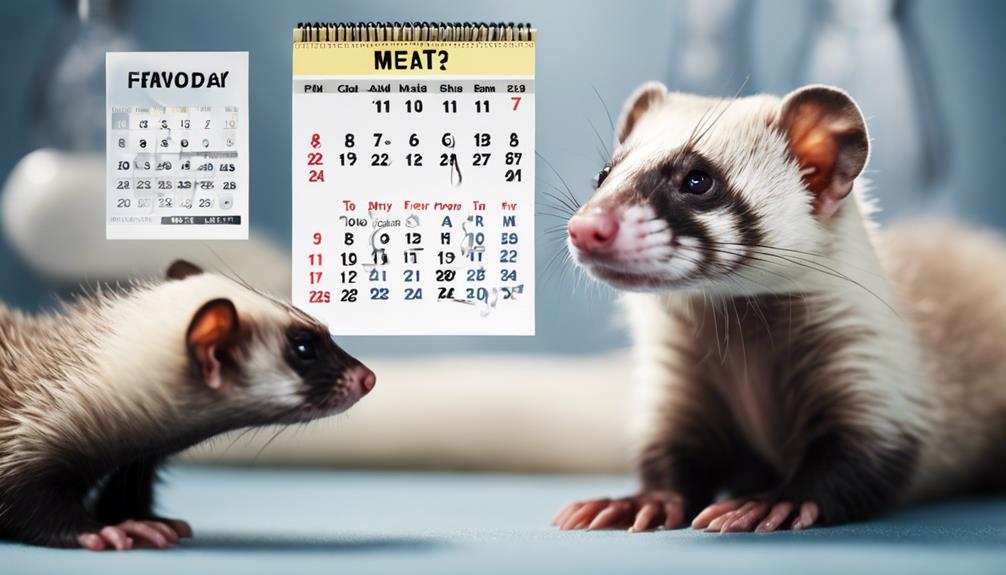
Unlocking the Secrets of Ferrets’ Breeding Cycles
Have you ever wondered about the fascinating world of ferrets’ breeding behaviors? Let’s dive into the amazing biological rhythms that shape their reproductive cycles!
What Makes Ferrets’ Breeding Cycles Unique?
- Ferrets, like many animals, have specific breeding behaviors and hormonal changes during their reproductive cycles.
- Female ferrets go through an annual reproductive cycle influenced by daylight length.
- The breeding season for ferrets typically starts in late winter and goes on until early summer.
What Happens During Breeding Season?
- Female ferrets become more receptive to mating during this time.
- Male ferrets may show increased breeding behaviors like scent marking and vocalizations to attract females.
- Understanding these cycles is crucial for successful mating and conception.
How to Monitor Your Ferrets’ Breeding Condition
- Keep a close eye on your ferrets’ behaviors and hormonal changes to identify peak breeding condition.
- Observing their interactions can help ensure a successful breeding process.
Genetic Considerations for Breeding

Are you curious about how ferret babies inherit their traits? Let’s dive into the world of ferret genetics to understand how coat color and bloodline purity play a vital role in breeding these adorable creatures.
Coat Color and Genetics:
- Did you know that coat color is like a genetic fingerprint for ferrets?
- Breeders carefully select specific coat colors to create adorable fur patterns.
- Understanding how genes pass down coat colors helps breeders predict the appearance of future ferret generations.
Bloodline Purity and Health:
- Why is it important to keep ferret bloodlines pure?
- Maintaining pure bloodlines reduces the risk of genetic health issues in baby ferrets.
- Breeding from pure bloodlines ensures that desirable traits are passed down without genetic complications.
Health Risks and Complications
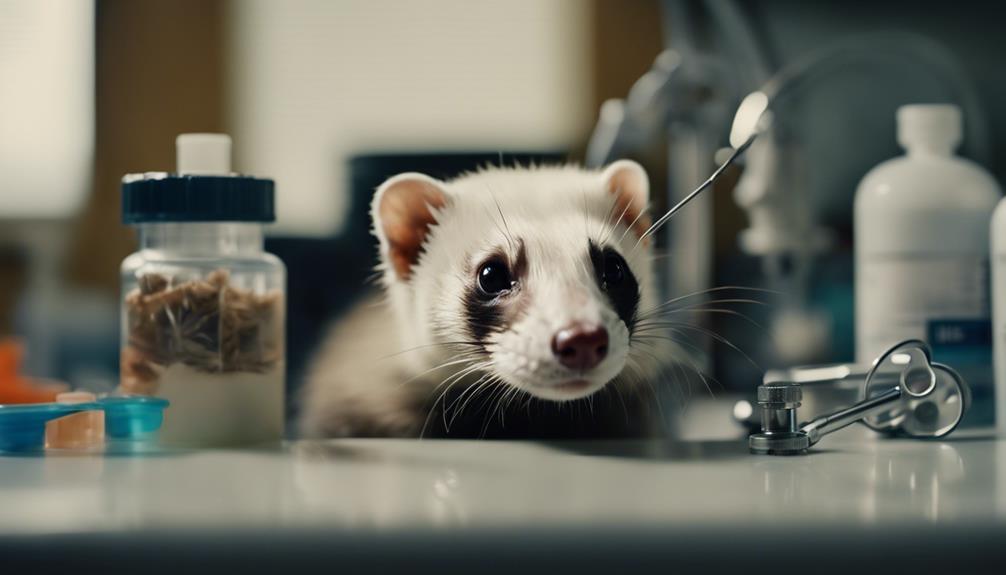
Breeding your ferret comes with various health risks and complications that every potential breeder should be aware of. Understanding the breeding health considerations, potential complications, and risks involved is crucial for making informed decisions.
It’s essential to be well-informed about the potential health implications for both the parent ferrets and their offspring.
Breeding Health Considerations
Are you thinking about breeding your ferret? Before diving in, it’s essential to consider the health aspects. Let’s explore how genetic testing and responsible breeding practices can ensure the well-being of your furry friends and their offspring.
Why is genetic testing important for ferret breeding?
- Genetic testing helps identify potential hereditary conditions that could be passed on.
- It allows breeders to make informed decisions when selecting breeding pairs.
How can responsible breeding practices help?
- Choosing healthy parent ferrets can reduce the risk of health complications in offspring.
- Providing proper prenatal care is crucial for the well-being of both parents and babies.
Why prioritize health in ferret breeding?
- Avoid passing on genetic disorders to future generations.
- Ensure the safety and welfare of the ferrets involved in the breeding process.
Potential Complications Overview
Are you curious about the risks and challenges of breeding ferrets? Let’s explore the common health concerns and complications that come with breeding these playful creatures. Here’s what you need to know to keep both the ferrets and their babies safe and healthy:
- Troubles During Breeding: Sometimes, ferrets can experience difficulties while mating, being pregnant, or giving birth, like a condition called dystocia.
- Inherited Health Issues: Breeding ferrets can pass down genetic problems to their offspring, potentially causing health complications.
- Reproductive System Troubles: Female ferrets may suffer from health issues caused by estrogen if they aren’t bred or spayed.
- Infections: Breeding can raise the chances of infections for both the ferrets and their baby ferrets.
- Stress and Behavior Changes: Breeding can lead to stress and changes in behavior for ferrets, impacting their overall well-being.
Risks to Be Aware
What You Need to Know About Breeding Ferrets
Hey there, future ferret breeders! Are you ready to dive into the exciting world of ferret breeding? Before you start, it’s essential to understand the risks and precautions involved in the process. Let’s take a closer look at what you need to know:
Breeding Risks and Precautions
Breeding Risks:
- Complications during birth, such as dystocia (difficulty giving birth)
- Genetic disorders that can be passed on to offspring
Precautions to Take:
- Schedule regular veterinary check-ups for your ferrets
- Ensure both ferrets are in optimal health before breeding
Ethical Breeding Practices
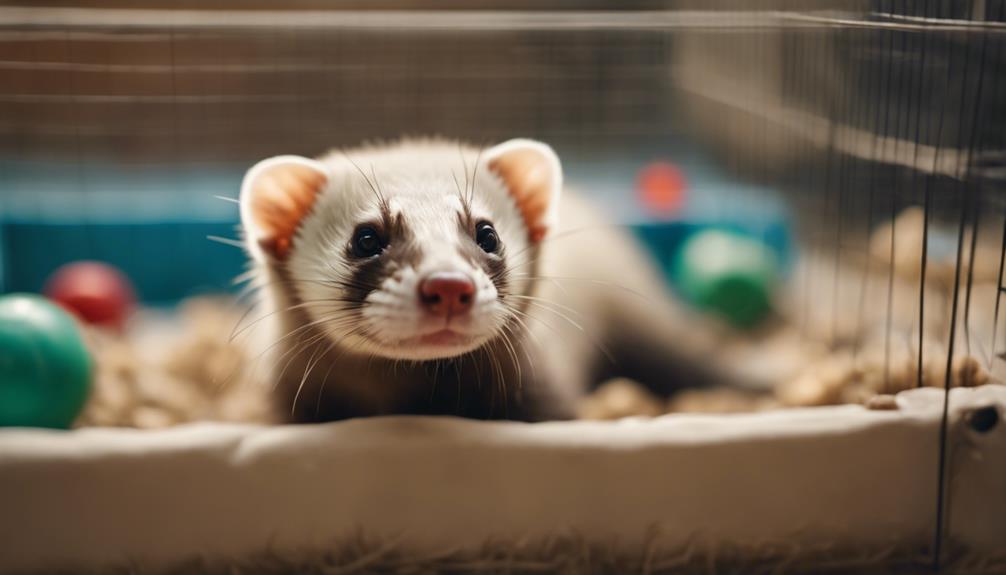
Are you thinking about breeding your ferret? It’s important to do it the right way to keep your furry friends healthy and happy. Here are some key things to keep in mind:
- Why it matters: Breeding ferrets responsibly means putting their well-being first. Healthy ferrets lead to healthy babies!
- Mix it up: When choosing which ferrets to breed, think about mixing different traits to keep the ferret population strong and healthy.
- Pick wisely: Select ferrets with good health, a friendly attitude, and overall awesomeness to make sure their babies inherit the best traits.
- Health check: Make sure your ferrets are in tip-top shape by getting them checked by a vet before breeding to avoid passing on any health issues.
- Give them love: Provide your ferrets and their babies with everything they need – from good food to a cozy home – to keep them happy and healthy.
Frequently Asked Questions
Can Ferrets Be Bred With Other Animals, Such as Cats or Dogs?
Breeding ferrets with other animals, like cats or dogs, is not recommended. Interspecies breeding can lead to genetic implications, health issues, and ethical concerns. It’s best to stick to breeding within the same species for the well-being of all involved.
How Do You Determine if a Ferret Is a Suitable Candidate for Breeding?
When determining if a ferret is a suitable candidate for breeding, factors to consider include health considerations, genetic testing, temperament evaluation, and breeding experience. These aspects help ensure the well-being of the ferret offspring.
Are There Specific Regulations or Guidelines for Breeding Ferrets in Different Countries?
Regulations for breeding ferrets vary globally. In many countries, laws govern breeding practices to ensure animal welfare. Guidelines emphasize ethical considerations, discouraging crossbreeding. Adhering to these standards is crucial to maintain the health and integrity of ferret populations.
What Are Some Common Misconceptions or Myths About Breeding Ferrets?
Common misconceptions about breeding ferrets include the belief that it’s easy or lucrative. In reality, it requires thorough knowledge of breeding ethics, health risks, genetic diversity, and population control. Responsible breeding is essential for ferret welfare.
How Can You Ensure the Safety and Well-Being of the Mother Ferret During the Breeding Process?
Ensuring the safety and well-being of the mother ferret during breeding is like guarding a fragile treasure. Adequate nutrition management and regular veterinary care are crucial. Monitoring her health closely ensures a successful and healthy breeding process.











